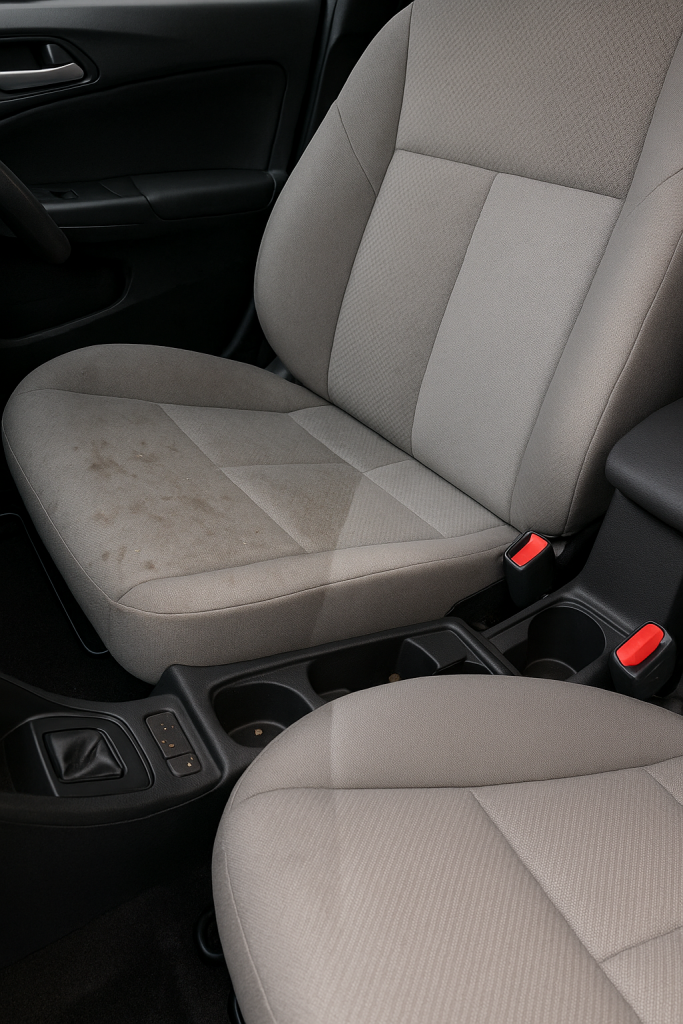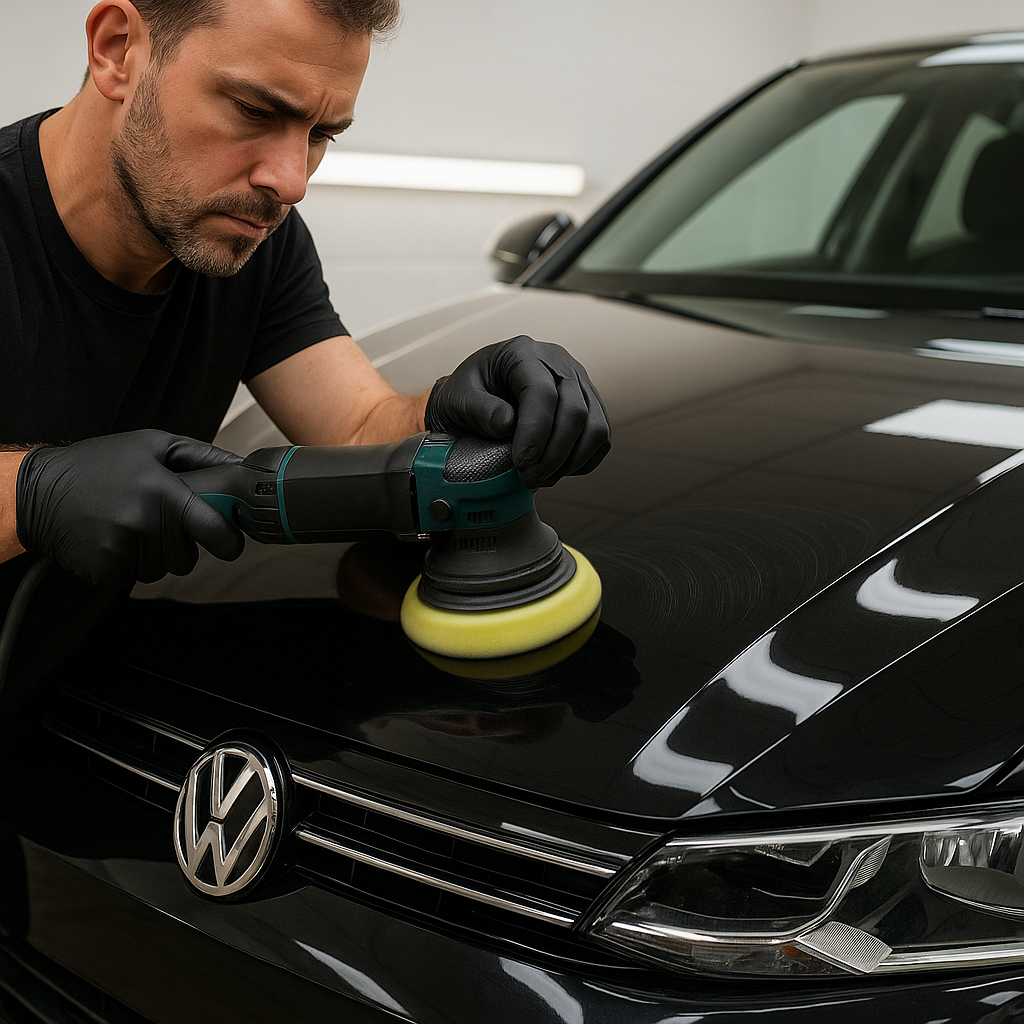Car Detailing Definition
Car detailing is more than just a car wash — it’s a deep-cleaning, restorative process that enhances, protects, and maintains a vehicle’s condition to a near-showroom level. Unlike a quick wash, detailing involves deep cleaning and protection to maintain your car’s condition long-term.
In the UK, where vehicles are exposed to harsh winters, salt on the roads, and urban pollutants, detailing is not just cosmetic — it’s preventative maintenance. For private owners, fleet managers, or car enthusiasts, understanding detailing can help preserve vehicle value, enhance daily enjoyment, and minimise long-term wear.
This in-depth guide will break down everything you need to know about car detailing in the UK. We’ll explore what it is, how it differs from valeting or washing, the processes involved, how often to do it, and why it’s becoming essential for UK motorists. We’ll also touch on costs, popular products and tools, expert advice, and what to expect whether you do it yourself or hire a professional.
What is Car Detailing?
Car detailing is the methodical cleaning, restoration, correction, and protection of both the exterior and interior of a vehicle. Unlike valeting or washing, detailing focuses on perfection — not just cleanliness. It is a layered process that can involve dozens of tools, specialist chemicals, and expert techniques aimed at extending a car’s life and visual appeal.
Whereas a car wash may take 15 minutes and a valet 1–2 hours, detailing can span anywhere from 4 hours to multiple days, depending on the scope of work and the vehicle’s condition.
Detailing vs Valeting vs Washing: What’s the Difference?
| Aspect | Car Wash | Valeting | Detailing |
|---|---|---|---|
| Duration | 10–30 minutes | 1–2 hours | 4–24+ hours |
| Scope | Surface-level clean | Interior vacuum + exterior wash | Deep clean, restoration, protection |
| Tools Used | Pressure washer | Basic chemicals, vacuums | Dual-action polishers, clay bars, etc. |
| Correction | None | Rarely | Multi-stage paint correction possible |
| Protection Applied | Wax (if any) | Wax or polish | Ceramic coatings, sealants, PPF |
| Cost (UK Average) | £5–£15 | £20–£60 | £100–£500+ |
The UK motorist often uses these terms interchangeably, but understanding the distinctions helps set realistic expectations and understand pricing structures. Regular detailing by a qualified professional can prevent costly repairs.
The Two Core Aspects of Car Detailing
1. Exterior Detailing
Exterior detailing involves cleaning, correcting, and protecting a car’s paintwork, glass, wheels, and exterior trim.
Step-by-step Exterior Process:
- Pre-wash / Snow Foam Application: Softens and lifts dirt before contact.
- Two-Bucket Method Hand Wash: Uses one bucket for shampoo and one for rinsing the mitt, reducing swirl risks.
- Wheel Cleaning: Uses acid-free wheel cleaners and dedicated brushes to remove brake dust and tar.
- Decontamination:
- Iron Fallout Remover: Dissolves embedded metallic particles.
- Tar Remover: Targets sticky asphalt contaminants.
- Clay Bar Treatment: Physically pulls contaminants from the clear coat.
- Paint Correction (Optional):
- Performed using machine polishers.
- Involves multiple passes with compounds and polishes.
- Removes swirl marks, light scratches, oxidation.
- Paint Protection:
- Wax (natural, like carnauba): 1–3 month durability.
- Sealant (synthetic): 6–12 months durability.
- Ceramic Coating: Bonds to paint, offering years of protection.
- Paint Protection Film (PPF): Clear vinyl layer to absorb physical impacts.
“Regular exterior detailing helps remove contaminants (road salt, industrial fallout and bird lime) that accelerate paint wear — industry experts agree it’s an important preventative step to reduce long-term degradation in UK conditions.”
Interior Detailing: Beyond a Routine Valet
Interior detailing is much more than a rapid hoover and wipe-over. The goal is to clean, sanitise, and shield each surface within the car. Professional detailers remove layers of everyday dirt, allergens, and bacteria that collect on high-touch surfaces.
Regular processes are:
Vacuuming & compressed air cleaning — carpets, mats, seats, and tight spots like vents and seams.
Shampooing and extraction — removal of dirt, stains, and odours from upholstery and carpet. Hot-water extractors are usually employed for deep penetration.
Steam cleaning — a fast-growing alternative to chemical disinfecting of interiors.
Leather cleaning & conditioning — professional pH-balanced cleaners remove impurities from pores, restoring suppleness, not cracking.
Plastics & trim restoration — non-greasy cleaning using cleaners, followed by UV-protective dressings to prevent fading or cracking.
Why Interior Detailing Matters
Hygiene: Research at Aston University discovered that the steering wheel is more bacterial per square centimetre than a public toilet. Other surfaces, such as gear shifters and cupholders, have high colony counts and require cleaning in detail. (Source: Aston University)
Air Quality: Cabin air filters, carpet, and ventilation systems can be home to dust, pollen, and mould spores. A good clean removes allergens and enhances in-car air.
Longevity: Leathers and soft-touch plastics will last much longer if regularly cleaned and conditioned.
Costs in the UK
Interior detailing can on occasion be bought separately or as part of a full detail. UK prices are generally in the range:
Basic interior detail (vacuum, wipe-down, windows) — £50–£100
Deep clean with shampoo & steam — £150–£250
Full premium package (with leather treatment & odour removal) — £250+
Prices will depend on location and vehicle size. Vans and SUVs might be more expensive because of interior space.
Is It Worth It?
Interior detailing is well worth the investment for drivers for health and comfort reasons. It’s also a good investment when it comes to selling your car — buyers respond favourably to a clean, sanitized interior.

“Multiple studies and swab tests have shown vehicle interiors can host higher colony counts on high-touch surfaces (steering wheel, cup holders) than some public surfaces — another reason for periodic professional interior sanitation.”
Paint Correction: What It Really Involves
Paint correction is the process of safely removing surface defects from a car’s clear coat to restore gloss and depth. These defects often include swirl marks, light scratches, oxidation, and hazing caused by improper washing or environmental exposure.
Unlike a quick polish at a car wash, professional paint correction is measured and methodical. Detailers use machine polishers with a combination of abrasive compounds and pads, gradually levelling out the damaged clear coat until the imperfections are no longer visible.
How Much Clear Coat Is Removed?
Modern clear coats are typically only 30–50 microns thick (about half the width of a human hair). Each polishing pass removes a very small amount — usually 1–5 microns depending on pad, compound, and pressure. For this reason, professionals use a paint depth gauge to measure thickness before and during correction, ensuring safe removal without risking a burn-through.
Correction Stages
Detailers usually describe paint correction in stages, based on how aggressive the process is:
Single-Stage Correction — a single polishing step using a medium compound. Removes light swirls, oxidation, and boosts gloss.
Two-Stage Correction — first, a heavier cutting polish to tackle deeper defects, followed by a refining polish to restore clarity.
Multi-Stage Correction — used for heavily damaged paint, often involving wet sanding, multiple cutting passes, and careful refining. Typically reserved for show cars or restorations.
Each stage takes many hours, and results vary depending on the car’s paint system, colour, and defect severity.
Costs in the UK
Paint correction is labour-intensive, so costs can vary significantly. As a rough guide from UK detailers:
Single-stage correction — from £250–£450 for a small car.
Two-stage correction — typically £500–£800.
Multi-stage/show correction — £1,000+, often spread over several days.
These prices usually include a protective wax or sealant, though many owners choose to upgrade to a ceramic coating afterwards for longer-term protection.
Is It Worth It?
If your car has light swirls and you want a noticeable cosmetic lift, a single-stage correction offers great value. For cars with heavy defects, or enthusiasts preparing for shows or resale, multi-stage correction can transform the finish — but it’s only worth doing if you’ll also maintain the car carefully afterwards.
Ceramic Coatings in the UK Climate
Ceramic coatings are a major evolution in automotive protection. They’re liquid polymers that chemically bond to factory paint, creating a hydrophobic, UV-resistant layer.
Advantages:
- Repels dirt, water, bird droppings
- Enhances gloss
- Makes maintenance washes easier
- Lasts up to 5 years
Limitations:
- Not scratch-proof
- Requires proper prep and curing
- Professional installation advised
Popular Brands in UK:
- Gtechniq (UK-based)
- CarPro CQuartz
- Gyeon Quartz
- Turtle Wax Hybrid Solutions (DIY ceramic)
“Improper application of ceramic coatings accounts for over 40% of premature failure complaints in the UK detailing market.”
— Detailing World UK Forum Survey, 2023
Interior Materials: What Detailers Know That You Should Too
Detailing isn’t a one-size-fits-all task. Different surfaces require tailored care:
| Surface | Recommended Treatment | Avoid |
| Leather | pH-neutral cleaner + leather conditioner | Baby wipes, alcohol-based sprays |
| Alcantara | Light steam + dedicated fabric brush | Over-wetting, scrubbing |
| Gloss Plastics | Microfibre + anti-static interior detailer | Paper towels, silicone sprays |
| Carpets | Low-moisture shampoo + extractor | Saturation |
Seasonal Detailing Strategy for UK Conditions
Spring
- Remove winter salt residue
- Deep clean undercarriage
- Prepare for pollen season (protect paint + glass)
Summer
- UV-protection wax or ceramic coating
- Vent sanitisation (air-con use increases)
Autumn
- Leaf debris removal
- Rain repellent on glass
Winter
- Sealant or ceramic coating application (before snow season)
- Dehumidifier in cabin to prevent mould
- Avoid auto car washes with brushes
“Regular detailing helps presentation and can influence buyer perception — valuation houses such as Glass’s provide pricing data that show condition and presentation materially affect resale pricing, though exact uplift varies by model and market.”
DIY vs Professional Detailing in the UK
DIY: Pros and Cons
Pros:
- Lower upfront cost
- Educational, satisfying
- Control over every step
Cons:
- Equipment costs add up
- High learning curve for paint correction
- Time intensive
- Mistakes (e.g. burn-through clear coat) can reduce value
Professional Services
Ideal For:
- High-value or classic cars
- First-time ceramic coatings
- Lease return pre-inspections
Cost Guide (UK, 2024):
- Basic detail: £100–£150
- Paint correction: £250–£600
- Ceramic coating: £300–£1,000
Frequently Asked Questions About Car Detailing
Car detailing is a thorough cleaning and restoration process that goes beyond a standard car wash. It involves deep-cleaning both the interior and exterior of a vehicle, using specialist tools and products to remove contaminants, enhance paintwork, and protect surfaces for long-term shine and durability.
A car wash is typically a quick, surface-level clean using soap and water. Detailing, on the other hand, involves meticulous cleaning, paint correction, and protection of both interior and exterior components, often restoring the vehicle to near showroom condition.
The time required for a car detail depends on the service level and vehicle condition. A basic detail may take 2 to 3 hours, while a full interior and exterior detail with paint correction can take 6 to 8 hours or longer.
In the UK, basic detailing starts from around £50, while a full detail with polishing, decontamination, and protection treatments can range between £150 and £700 or more, depending on the size of the vehicle and the services included.
Yes, car detailing is worth it for maintaining your vehicle’s appearance, resale value, and overall condition. It not only makes your car look great but also protects paint, upholstery, and trim from long-term damage caused by dirt, UV rays, and moisture.
Most experts recommend detailing your car every 4 to 6 months. However, if you drive frequently or park outdoors, more frequent detailing may be needed to keep your vehicle protected and looking its best.
A full car detail typically includes exterior washing, tar and iron decontamination, clay bar treatment, polishing or paint correction, wax or ceramic protection, plus a full interior vacuum, deep clean, plastic trim treatment, and glass polishing.
Yes, many aspects of car detailing can be done at home with the right products and knowledge. However, for professional results—especially with paint correction or ceramic coatings—hiring an experienced detailer is often the better choice.
Final Thoughts: More Than Just a Clean Car
Car detailing in the UK is a growing industry — not just because of appearance, but for its role in maintenance and value preservation. As electric vehicles become more common and resale values grow in importance, vehicle presentation will continue to matter.
Whether you choose to DIY on the weekends or entrust your car to a professional, detailing pays dividends in pride, protection, and pounds.
Want to find a certified detailer near you? Browse our car detailing directory to compare reviews, pricing, and services.

